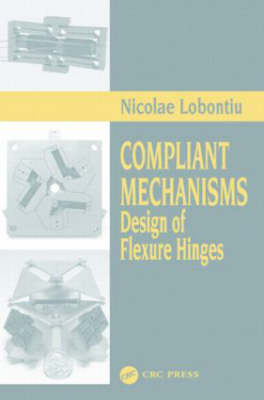
Compliant Mechanisms
Crc Press Inc (Verlag)
978-0-8493-1367-7 (ISBN)
- Titel erscheint in neuer Auflage
- Artikel merken
Flexure hinges hold several advantages over classical rotation joints, including no friction losses, no need for lubrication, no hysteresis, compactness, capacity to be utilized in small-scale applications, ease of fabrication, virtually no assembly, and no required maintenance. Compliant Mechanisms: Design of Flexure Hinges provides practical answers to the present and future needs of efficient design, analysis, and optimization of devices that incorporate flexure hinges. With a highly original approach the text:
Discusses new and classical types of flexure hinges (single-, two- and multiple-axis) for two- and three-dimensional applications
Addresses a wide range of industrial applications, including micro- and nano-scale mechanisms
Quantifies flexibility, precision of rotation, sensitivity to parasitic loading, energy consumption, and stress limitations through closed-form compliance equations
Offers a unitary presentation of individual flexure hinges as fully-compliant members by means of closed-form compliance (spring rates) equations
Fully defines the lumped-parameter compliance, inertia and damping properties of flexure hinges
Develops a finite element approach to compliant mechanisms by giving the elemental formulation of new flexure hinge line elements
Incorporates more advanced topics dedicated to flexure hinges including large deformations, buckling, torsion, composite flexures, shape optimization and thermal effects
Compliant Mechanisms: Design of Flexure Hinges provides practical answers and directions to the needs of efficiently designing, analyzing, and optimizing devices that include flexure hinges. It contains ready-to-use plots and simple equations describing several flexure types for the professional that needs quick solutions to current applications. The book also provides self-contained, easy-to-apply mathematical tools that provide sufficient guidance for real-time problem solving of further applications.
Preface
INTRODUCTION
COMPLIANCE-BASED DESIGN OF FLEXURE HINGES
Introduction
Generic Mathematical Formulation
Single-Axis Flexure Hinges for Two-Dimensional Applications
Multiple-Axis Flexure Hinges for Three-Dimensional Applications
Two-Axis Flexure Hinges for Three-Dimensional Applications
Conclusions
STATICS OF FLEXURE-BASED COMPLIANT MECHANISMS
Introduction
Planar Compliant Mechanisms
Spatial Compliant Mechanisms
DYNAMICS OF FLEXURE-BASED COMPLIANT MECHANISMS
Introduction
Elastic Potential Energy for Individual Flexure Hinges
Kinetic Energy for Individual Flexure Hinges
Free and Forced Response of Flexure-Based Compliant Mechanisms
Damping Effects
FINITE ELEMENT FORMULATION FOR FLEXURE HINGES AND FLEXURE-BASED COMPLIANT MECHANISMS
Introduction
Generic Formulation
Elemental Matrices for Flexure Hinges
Elemental Matrices for Rigid Links
Application Example
Appendix
TOPICS BEYOND THE MINIMAL MODELING APPROACH TO FLEXURE HINGES
Large Deformations
Buckling
Torsion of Noncircular Cross-Section Flexure Hinges
Composite Flexure Hinges
Thermal Effects
Shape Optimization
Means of Actuation
Fabrication
APPLICATIONS OF FLEXURE-BASED COMPLIANT MECHANISMS
Macroscale Applications
Microscale (MEMS) Applications
| Erscheint lt. Verlag | 27.12.2002 |
|---|---|
| Zusatzinfo | 1515 equations; 4 Tables, black and white; 127 Illustrations, black and white |
| Verlagsort | Bosa Roca |
| Sprache | englisch |
| Maße | 152 x 229 mm |
| Gewicht | 794 g |
| Themenwelt | Technik ► Elektrotechnik / Energietechnik |
| Technik ► Maschinenbau | |
| ISBN-10 | 0-8493-1367-8 / 0849313678 |
| ISBN-13 | 978-0-8493-1367-7 / 9780849313677 |
| Zustand | Neuware |
| Informationen gemäß Produktsicherheitsverordnung (GPSR) | |
| Haben Sie eine Frage zum Produkt? |
aus dem Bereich



